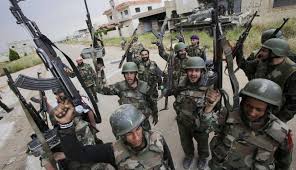The Fog of War
The fog of war wafts around us as preparations continue for a US-French military action against Syria. President Barack Obama is failing to gain much support for such a move. According to Obama, a coordinated military response is needed to teach Syria not to use chemical weapons against men, women and children in violation of an international ban against their use. It is not yet clear who is responsible for using them, the regime of Bashar al-Assad or the rebels fighting to bring down his dictatorship. President Vladimir Putin of Russia maintains Syria would not use such weapons especially since an inspection team from the United Nations was on the ground in Damascus at the time.
As the majority of leaders at the G20 Summit in Saint Petersburg balked at the prospect of a cruise missile campaign against Syria, the drums of war beat on. The US Secretary of State, John Kerry, says the Arab League offered to bankroll a military action. That amounts to paying someone else to do the dirty work of getting rid of hard-line Islamists, while making mercenaries of the US military. Iran and its allies, the Hezbollah in southern Lebanon, promise to attack Israel if Washington goes ahead with its plan.
 Military Strike
Military Strike
UN Secretary-General Ban Ki-Moon says a military strike against Syria for a chemical-weapons attack is legal only in self-defence under the UN charter, or if approved by the Security Council. He warns that such an action could unleash more turmoil and bloodshed. Ki-Moon also says that if UN inspectors confirm the use of chemical weapons in Syria, the Security Council should overcome its current deadlock and take action against such a violation of international law.
After the lies about arms of massive destruction in Iraq and subsequent death of hundreds of thousands of innocent people, the world has little trust in the US, and is demanding verification in the form of irrefutable proof of who precisely used chemical weapons in Syria. Even then, given the probable consequences, it’s doubtful there will be overwhelming support in favour of military action.
Countries, like people, act in their own interest. Unfortunately, that often leads to pretext. So is this talk of a punitive strike over the use of chemical weapons being used as a pretext? If so, to what end?
Three reasons come to mind:
The US and European economies are not faring well and nothing generates profits, or revitalises an underperforming economy, like widespread conflict.
Russia has been supporting Syria, gaining both influence in the Middle East, and a naval base in Tartus on the Mediterranean, which along with Kaliningrad on the Baltic Sea, are the only naval bases it has outside the former Soviet Union – not something a country gives up easily.
Mideast oil drives China’s industry and military. According to a US National Intelligence Estimate, China is on track to equal the United States as a world power by 2040. In the spring of 2012, Obama transferred US soldiers to Australia, and shifted the focus of US foreign policy to southern Asia to deter Chinese expansion. The US now exerts greater surveillance over the Malacca Strait, one of the world’s most strategic waterways, which with the Strait of Hormuz in the Persian Gulf, is on the route used to transport Persian Gulf oil to the factories and consumers of China.
The Fallout
As the fallout from the Arab Spring continues and the Middle East tries to find a way to govern itself free of outside forces such as the United States, England, France or Russia, it’s increasingly clear in this fog of war that more people will continue to be massacred. Diplomacy as a means of peace has simply been shunted aside. Military powers, whether from east or west, have deemed strategic interests more important than human lives.